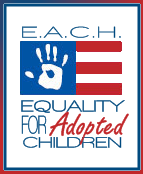Older Child Adoption - What to Think About, Tips for Successful Transition
by Susan Serrano as reported in Adoptive Families Magazine.
As more infants and toddlers are united with adoptive families within their birth countries, an increasing number of older children have become available for international adoption in recent years. “I think older children have always been there, but there is a growing awareness that there are families interested in adopting them,” said Denise Schoborg, director of Dillon International’s China adoption program. “The
need for families is very real, but prospective parents need to do some soul-searching to determine if they are ready to parent an older international adoptee.”
The realistic expectations, research and education, that are key to any successful adoption experience, become even more vital when considering the adoption of an older child, who may have some additional struggles adjusting to life with their adoptive family. “Kids that come from institutional settings are survivors. It may take some time for the child to learn what their role is in a healthy family and develop interpersonal skills in their new environment,” explained Debbie Wynne, director of Dillon International’s Texas office and Buckner Adoption and Maternity Services. “A child may be biologically a 7-year-old, but that does not mean that they have had seven years of nurturing by loving parents. They may even have been in a situation where they had to act as a parent.”
“It is important for parents to realize that while they may be dealing with a 7-year-old that has the street smarts of a 14-year-old, that same child could also have the attachment needs of an infant. You have to be prepared to parent where that child is developmentally in the moment,” Schoborg added.
Patience is critical as the child attaches to the adoptive family and learns how to be nurtured. “The child may take their disappointments out on their family, but parents need to recognize that the child is acting out of a sense of grief and loss and to steadfastly offer unconditional love in return. They should not take those attacks personally,” Wynne said.
Families preparing to adopt an older child can pave the way for smoother transitions with plenty of advance education that focuses on the needs of older adoptees. It is also crucial for families to surround themselves with a support network that includes adoption professionals and adoptive families, Schoborg recommended.
Securing the services of a translator and locating other language resources prior to the child’s arrival will also go a long way toward building attachment and establishing relationships, Wynne added.
Although the adoption of an older child does come with some unique challenges, it offers advantages as well, Wynne points out. “With an older child, there is an opportunity to really ‘see’ them,” she explained. “You can know their health and how they respond in social and educational environments. With an infant or toddler, you really haven’t seen the person that they will grow into being.”
“There are children who desire so much to be in a family,” Wynne said. “The families that do well adopting older children are resourceful and committed to helping their child heal from the traumas of the past. It is exciting to see families that have chosen this path do extremely well. There are families for every
kind of child.”
Recommended Reading:
• Raising Adopted Children by Lois Melina
• Attaching in Adoption by Deborah Gray
• Nurturing Adoptions by Deborah Gray
• The Connected Child by Karyn Purvis, Ph.D.
• Adopting the Hurt Child by Gregory Keck, Ph.D.
• Parenting the Hurt Child by Gregory Keck, Ph.D.
• With Eyes Wide Open by Margi Miller, MA, & Nancy Ward, MA, LISCW
• Toddler Adoption by Mary Hopkins Best, Ed.D.
• Parenting Your Older Adopted Child by Brenda McCreight, Ph.D., RSW
• Our Own - Adopting and Parenting the Older Child by Trish Maskew
• Adopted Teens Only: A Survival Guide to Adolescence by Danea Gorbett
• Beneath the Mask by Debbie Riley, MS
• Parenting Adopted Adolescents: Understanding and Appreciating Their Journeys by Gregory C. Keck, Ph.D.
Susan Serrano is director of media relations for Dillon International, Inc. Founded in 1972, Dillon International is a licensed, nonprofit adoption and humanitarian aid agency that is affiliated with Dallas-based Buckner International. Headquartered in Tulsa, Okla.—with branch locations in Tustin, Calif. (in Orange County); the Dallas-Fort Worth, Texas area; the Kansas City, Kansas area; St. Louis, Mo.; Little Rock and Fayetteville, Ark; and Richmond, Ind.—Dillon International is Hague Accredited through the Council on
Accreditation to process international adoptions pursuant to the Intercountry Adoption
Act of 2000.
Friday, May 13, 2011
Tips and Recommended Reading When Adopting an Older Child
Subscribe to:
Post Comments (Atom)






No comments:
Post a Comment